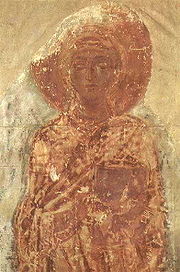Thecla
Saint Thecla | |
|---|---|
 Fresco in Saviour Cathedral of Chernihiv, XI c. | |
| Virgin and Martyr | |
| Born | 1st century AD |
| Died | 1st century AD |
| Venerated in | Roman Catholic Church Eastern Orthodox Churches |
| Feast | September 23 (Roman Catholic Church) September 24 (Eastern Orthodox Churches) |
Saint Thecla was a saint of the early Christian Church, and a reported follower of Paul of Tarsus in the 1st century A.D. She is not mentioned in the New Testament, but the earliest record of her comes from the apocryphal Acts of Paul and Thecla, probably composed in the early 2nd century.
Biography
According to the Acts of Paul and Thecla, Thecla (St. Taqla) was a young noble virgin who listened to Paul's "discourse on virginity" and became Paul's follower. Thecla's mother, and fiancé, Thamyris, became concerned that Thecla would follow Paul's demand "that one must fear only one God and live in chastity", and punished both Paul and Thecla. She was miraculously saved by a storm from being burned at the stake, and traveled with Paul to Pisidian Antioch. There a nobleman named Alexander desired Thecla and attempted to take her by force. Thecla fought him off, assaulting him in the process, and was put on trial for assaulting a nobleman. She was sentenced to be eaten by wild beasts, but was again saved by a series of miracles when the female beasts protected her against her male aggressors. No other early account of Thecla exists.
Cult of Saint Thecla of Iconium
In the Eastern Church, the wide circulation of the Acts of Paul and Thecla is evidence of her veneration. She was called "Apostle and protomartyr among women" and even "equal to the apostles." She was widely cited as an ascetic role model for women. Her cult flourished particularly at Seleucia (where she was said to be buried), Iconium (present day Konya), and Nicomedia. The cult also appeared, at least as early as the fourth century, in Western Europe. In Bede's martyrology, Thecla is celebrated on the September 23, which is still her feast day in the Roman Catholic Church. The Eastern Orthodox Churches commemorate her on September 24.
A local martyr legend, of Tecla, may have inspired this episode, in which she was connected to Paul of Tarsus. "It is otherwise difficult to account for the very great popularity of the cult of St. Thecla, which spread over East and West, and made her the most famous of virgin martyrs," wrote M.R. James, the editor of this Acta, (James 1924).
Tomb of Thecla, Maalula
In Maalula, Syria, there is a Greek Orthodox nunnery of St. Thecla, Deir Mar Takla, built near what is said to be her cave tomb, reached by stairs in the mountainside, a pilgrimage site with a holy well. The local legend is that the mountain opened miraculously to protect Thecla from her persecutors.
Catacomb of Saint Tecla, Rome
In June 2009, on a wall of the Catacomba di Santa Tecla, Vatican archaeologists of the Ponitifical Commission for Sacred Archaeology, using laser technology to remove layers of clay and lime rind, discovered a frescoed portrait which they believe is the oldest image in existence of St Paul the Apostle, dating from the late fourth century.[1]
Patronage
Santa Tecla is the patron saint of Tarragona, Spain, where her feast day is the major fiesta of the city and the cathedral is dedicated to her. In Spain, she is sometimes facetiously referred to as the patron saint of computers (tecla means "key" on a keyboard in Catalan and Spanish).
There are three Roman Catholic parishes named for Saint Thecla placed in Clinton Township, Michigan, Pembroke, Massachusetts, and Chicago, Illinois. The village of Llandegla in North Wales is also named after her.
See also
Bibliography
- Eliott, J.K., "The Apocryphal New Testament: A Collection of Apocryphal Christian Literature in an English Translation," Oxford: Oxford University Press, 1993.
- MacDonald, D.R., "The Legend and the Apostle: The Battle for Paul in Story and Canon," Philadelphia: Westminster Press, 1983.
- Kirsch, J.P., Catholic Encyclopedia: "Sts. Thecla" , Volume XIV, New York: Robert Appleton Company, 1912.
- Ehrman, Bart D., "Lost Christianities: The Battles for Scripture and the Faiths We Never Knew," Oxford University Press, 2005, ISBN 978-0195182491.
References
- ^ Guardian UK: "Pope: Scientific analysis done on St. Paul's bones", 29 June 2009 accessed 30 June 2009.
External links
- Acts of Paul and Thecla: translated probably by Jeremiah Jones, (1693-1724)
- Early Christian Writings:`Acts of Paul and Thecla (e-text) ed. M.R. James, 1924.
- Nancy A. Carter, "The Acts of Thecla: a Pauline tradition linked to women"
- Catholic Encyclopedia: Sts. Thecla
- Statue in St Peter's Square
